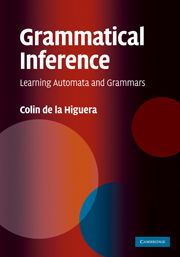Book contents
- Frontmatter
- Contents
- Preface
- Acknowledgements
- 1 Introduction
- 2 The data and some applications
- Part I The Tools
- Part II What Does Learning a Language Mean?
- 7 Identifying languages
- 8 Learning from text
- 9 Active learning
- 10 Learning distributions over strings
- Part III Learning Algorithms and Techniques
- References
- Index
9 - Active learning
from Part II - What Does Learning a Language Mean?
Published online by Cambridge University Press: 05 July 2014
- Frontmatter
- Contents
- Preface
- Acknowledgements
- 1 Introduction
- 2 The data and some applications
- Part I The Tools
- Part II What Does Learning a Language Mean?
- 7 Identifying languages
- 8 Learning from text
- 9 Active learning
- 10 Learning distributions over strings
- Part III Learning Algorithms and Techniques
- References
- Index
Summary
No one can tell you how to do it. The technique must be learned the way I did it, by failures.
John Steinbeck, Travels with CharlieSimilarly, a responsive informant could answer questions involving non-terminals, or instead of responding ‘No’ could give the closest valid string.
Jim Horning (Horning, 1969)There are several situations where the learning algorithm can actively interact with its environment. Instead of using given data, the algorithm may be able to perform tests, create new strings, and find out how far he may be from the solution. The mathematical setting to do this is called active learning, where queries are made to an Oracle.
In this chapter we cover positive and negative aspects of this important paradigm in grammatical inference, but also in machine learning, with again a special focus on the case of learning deterministic finite automata.
About learning with queries
In Section 7.5 we introduced the model of learning from queries (or active learning) in order to produce negative results (which could then also apply to situations where we have less control over the examples) and also to find new inference algorithms in a more helpful but credible learning setting.
Why learn with queries?
Active learning is a paradigm first introduced with theoretical motivations but that for a number of reasons can today be considered also as a pragmatic approach.
- Type
- Chapter
- Information
- Grammatical InferenceLearning Automata and Grammars, pp. 184 - 195Publisher: Cambridge University PressPrint publication year: 2010

